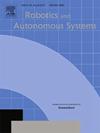改进了未知扰动下多四旋翼载荷运输的规定性能控制
IF 5.2
2区 计算机科学
Q1 AUTOMATION & CONTROL SYSTEMS
引用次数: 0
摘要
针对具有复杂非线性动力学和未知外部干扰的多四旋翼悬载系统,提出了一种鲁棒增强控制策略。采用Udwadia-Kalaba方法建立了系统的精确动力学模型。采用基于图论的分布式协同规划框架,实现多架四旋翼机之间有效的信息交换和协同控制。为了减轻未知干扰的影响,如风场和有效载荷质量的变化,干扰观测器被开发来估计和补偿这些干扰,从而提高系统的鲁棒性。此外,提出了一种改进的规定性能控制方法,以解决超出性能边界的问题。通过自适应调整规定的性能边界并结合积分反演,有效地减小了系统的稳态误差,实现了对跟踪误差和闭环稳定性的实时约束。仿真结果表明,该控制策略显著提高了多四旋翼悬载系统的控制性能和抗扰能力,具有良好的鲁棒性。本文章由计算机程序翻译,如有差异,请以英文原文为准。
Improved prescribed performance control for multi-quadrotor payload transport under unknown disturbances
This paper presents a robust and enhanced control strategy for a multi-quadrotor suspended payload system, which is characterized by complex nonlinear dynamics and unknown external disturbances. A precise dynamic model of the system is formulated using the Udwadia–Kalaba method. A distributed cooperative planning framework, based on graph theory, is employed to enable effective information exchange and cooperative control among multiple quadrotors. To mitigate the impact of unknown disturbances, such as wind fields and variations in payload mass, a disturbance observer is developed to estimate and compensate for these disturbances, thereby enhancing system robustness. Furthermore, an improved prescribed performance control method is proposed to address the issue of exceeding performance boundaries. The steady-state error of the system is effectively reduced by adaptively adjusting the prescribed performance boundary and combining it with integral backstepping, and real-time constraints on tracking errors and closed-loop stability are achieved. Simulation results validate that the proposed control strategy significantly enhances the control performance and disturbance rejection capability of the multi-quadrotor suspended payload system, demonstrating superior robustness.
求助全文
通过发布文献求助,成功后即可免费获取论文全文。
去求助
来源期刊

Robotics and Autonomous Systems
工程技术-机器人学
CiteScore
9.00
自引率
7.00%
发文量
164
审稿时长
4.5 months
期刊介绍:
Robotics and Autonomous Systems will carry articles describing fundamental developments in the field of robotics, with special emphasis on autonomous systems. An important goal of this journal is to extend the state of the art in both symbolic and sensory based robot control and learning in the context of autonomous systems.
Robotics and Autonomous Systems will carry articles on the theoretical, computational and experimental aspects of autonomous systems, or modules of such systems.
 求助内容:
求助内容: 应助结果提醒方式:
应助结果提醒方式:


